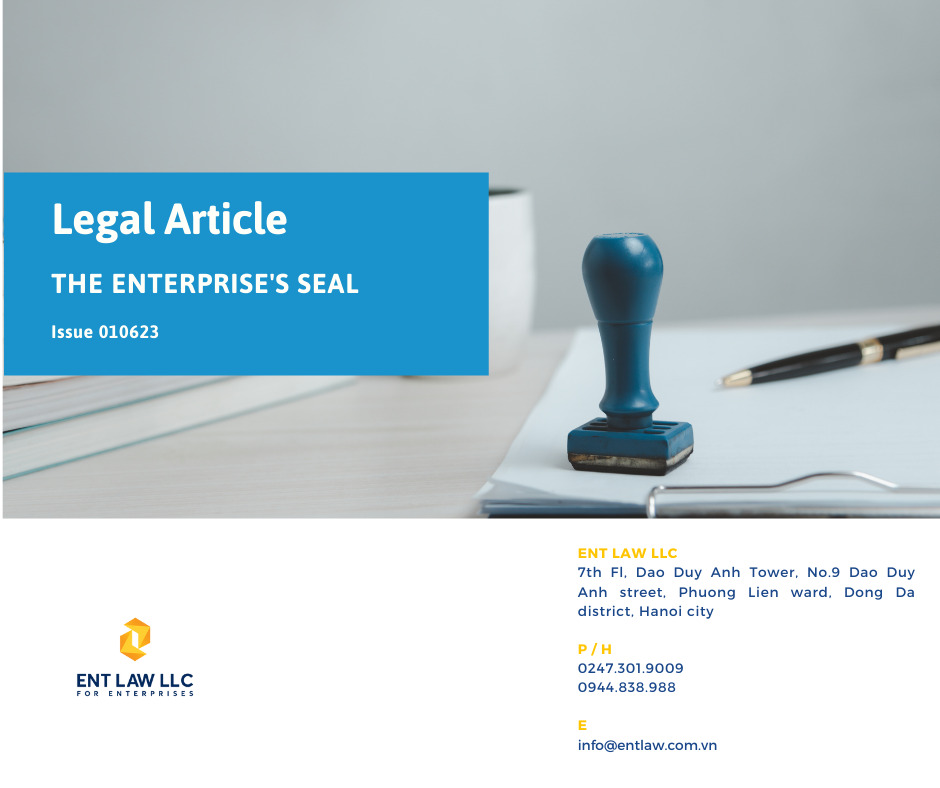Dear Valued Clients,
Like an enterprise name or code, a corporate seal is also a form of distinguishing the difference between an enterprise and another. When executing transactions or agreements, the seal is considered a sign of the enterprise and represents the legal value of the documents being sealed.
To catch up with regulations on the corporate seal of the Law on Enterprise No. 59/2020/QH14 of the National Assembly promulgated on June 17, 2020 (the “Law on Enterprise 2020”), you may find below our legal article in this respect.
1. Provisions on corporate seal under the Law on Enterprise
One of the first tasks that an enterprise needs to do after its establishment is to make a corporate seal for its own use. The seal of an enterprise is considered proof of the legal recognition of the establishment and existence of that enterprise.
According to the provisions of Article 43.1 Law on Enterprise 2020, the enterprise’s seals include:
A seal is made at the seal engraving facility;
- Or a seal in the form of a digital signature as prescribed by e-transaction laws.
Thus, for the first time, the Law on Enterprise 2020 recognizes the enterprise’s seals that exist in two forms, including A seal made at the seal engraving facility and A seal in the form of a digital signature as prescribed by e-transaction laws. The regulation on recognition of digital signatures as the enterprise’s seals is a new content of Law on Enterprise 2020 compared to the provisions of the Law on Enterprise No. 68/2014/QH13 of the National Assembly promulgated on November 26, 2014 (“Law on Enterprise 2014”).
According to Article 3.17 Decree No. 130/2018/ND-CP of the Government dated September 27, 2018, guiding the law on e-transactions of digital signatures and digital signature authentication, the digital signature is understood as a form of electronic signature created by the transformation of a data message using asymmetric cryptography in which those who have initial data messages and the public key of the signer can be determined exactly:
- The above transformation is created by the correct private key corresponding to the public key in the same key pair;
- The integrity of the content of data messages since the implementation of the mentioned above transformation.
The inclusion of a digital signature as an enterprise’s seal is not only consistent with the popular practice of e-transaction laws but also helps the enterprise have more options in using the seal instead of just using the physical seal as before.
2. Quantity, design, and content of the corporate seal
According to Article 43.2 of the Law on Enterprise 2020, the enterprise has the right to decide on the type, quantity, design, and content of its seal. Besides, enterprise law also allows enterprises to decide on the type, quantity, design, and content of the seals of its branches, representative offices, and other units. This is a new point compared to the previous regulation, expanding the rights of executives of an enterprise[1].
Previously, according to Article 44.1 of the Law on Enterprise 2014, the seal must clearly show information about the enterprise name and enterprise code. However, the Law on Enterprise 2020 leaves it open for enterprises to decide the form of expression of its seal.
3. Management and storage of the corporate seal
Managing and keeping the corporate seal is one of the most important steps in the process of running an enterprise. The Law on Enterprise 2020 has regulated the management and storage of the corporate seal with many differences compared to the previous regulations, which are specified as follows:
-
Enterprises do not need to register or notify the seal sample of the competent authority
Previously, according to Article 44.2 of the Law on Enterprise 2014, enterprises can make their own seals, but before using the seal, the enterprise must send the seal design to the business registration authority in order for them to post it on the National Business Registration Portal. However, at the moment, the Law on Enterprise 2020 has removed this requirement. As a result, from January 1, 2021, enterprises will not need to register with or notify the seal sample of the competent authority. This change aims to simplify administrative procedures, helping enterprises save time and effort in the process of implementation of enterprise-related procedures.
-
Innovation in the management and storage of the corporate seal
Article 44.3 Law on Enterprise 2014 stipulates that the management and storage of the seal of an enterprise shall comply with the charter of such enterprise. Accordingly, management and storage of the corporate seal are only regulated in the charter.
However, once the Law on Enterprise 2020 has been issued, it helps expand the rights of enterprises, branches, representative offices, or other dependent units of the enterprises in managing the seal themselves in other documents, not only the charter. Specifically: “The management and storage of seals shall comply with the company’s charter or regulations of the enterprise, branch, representative office or unit that owns the seal”[2]. Thus, in case a branch, representative office, or other unit makes a seal itself, it shall stipulate its own regulations on the management and preservation of its seal, regardless of the enterprise’s charter.
As always, we hope you find this Legal Article useful and look forward to working with you in the future.
Kind regards,
ENT LAW LLC
The full version of this Legal Article can be found here.
——————-
[1]Article 4.24 of the Law on Enterprise 2020: “Executive of an enterprise means the owner of a sole proprietorship, a general partner of a partnership, chairperson or member of the Member/Partner Assembly, President of a company, President or member of the Board of Directors, Director/General Director, or holder of another managerial position prescribed in the company’s charter”.
[2]Article 43.3 of the Law on Enterprise 2020.




Issue of February 2025 – Decree No. 174/2024/ND-CP regulating administrative penalties in the field of insurance business
Dear Valued Clients, On December 30, 2024, the Government issued Decree No. 174/2024/NĐ-CP (“Decree 174”) on administrative penalties...
Feb
Issue of January 2025 – Policy on reduction of Value Added Tax according to Resolution No. 174/2024/QH15 dated November 30, 2024 of the National Assembly
Dear Valued Clients, On December 31, 2024, the Government issued Decree No. 180/2024/ND-CP (“Decree 180”), regulating the policy...
Jan
Mr. Hoang Phuong Nam – Legal Assistant
Mr. Hoang Phuong Nam is an experienced legal specialist, particularly in corporate, investment, labor, and intellectual property law....
Ms. Doan Huong Giang – Legal Assistant
Ms. Doan Huong Giang is a seasoned legal expert with a solid educational and professional background in corporate...